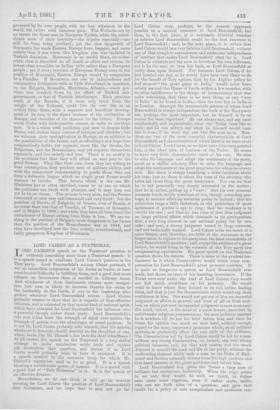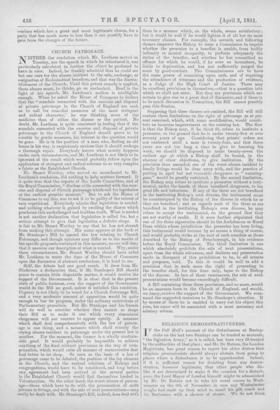LORD CAIRNS AS A STATESMAN.
TORD CAIRNS'S speech on the Transvaal question is 1 evidently something more than a Transvaal speech ; it is a speech meant to vindicate Lord Cairns's position in the Tory party. Lord Beaconsfield's serious illness portends, if not an immediate resignation of his duties as leader, at least considerable difficulty in fulfilling them, and a good deal more reliance on lieutenants than is needful in ordinary times. And whichever of these lieutenants obtains most recogni- tion just now, is likely to increase thereby his claim to the leadership in the Lords, if not to the leadership alto- gether, whenever Lord Beaconsfield retires. Lord Cairns probably wanted to show that he is capable of that effective criticism, and is animated by that special kind of national spirit, which have obtained for Lord Beaconsfield his influence over a powerful though rather dumb party. Lord Beaconsfield's rule over it has been the triumph of mind over matter, the triumph of genius over the advantages of social position. Is it not fit, Lord Cairns probably asks himself, that his mantle, whenever it descends, should descend on the shoulders of one, whose brain, like Mr. Disraeli's, has been his chief inheritance ? At all events, the speech on the Transvaal is a very skilful attempt to make numberless noble lords and squires ask themselves that question, and answer it as Lord Cairns would probably wish to have it answered. It is a speech marked by the corrosive irony for which Mr. Disraeli's reputation used to be so great. It is a speech showing a considerable power of menace. It is a speech with a good deal of "Rule Britannia" in it. It is the speech 'of an effective debater.
Nevertheless, we do not think it will go far towards securing for Lord Cairns the position of Lord Beaconsfield's first lieutenant, and we hope that it may not go far. Lord Cairns may, perhaps, be the nearest approach possible to a natural successor to Lord Beaconsfield, but then, in the first place, it is extremely doubtful whether an inferior Lord Beaconsfield would be -the best successor to Lord Beaconsfield ; and, in the next place, it is certain that Lord Cairns would be a very inferior Lord Beaconsfield, without any of that complete separateness and audacious independence of intellect that makes Lord Beaconsfield what he is. Lord Cairns is certainly not the man to browbeat his own followers, nor is he the man to turn his back, as Lord Beaconsfield so coolly does, upon himself. For instance, Lord Cairns, if he had boasted ono day, as he would have been very likely to do for the benefit of Tory squires, that by his Afghan policy he had secured " the great gates of India," would never have calmly assured the House of Lords within a few months, with an utter indifference to the charge of inconsistency that was quite refreshing, that there is no such thing as any " key to India" to be found in India,—that the true key to India is in London. Amongst the innumerable persons of whom Lord Beaconsfield is always independent, the bulk of the Tory party are, perhaps, the most important., but lie himself is by no means the least important.' He can always say, and say most emphatically and impressively, what the Tories least like to hear ; and he can always say what he himself would least like to hear, if he were any one but the man ho is. Now, these are two of the most essential characteristics of Lord Beaconsfield, and characteristics of which there is no trace at all in Lord Cairns. Lord Cairns, as we have more than once painted him, is the ideal man of business of the Tories. He seems to have very little characteristic creed of his own. He tries to echo the language and adopt the sentiments of his party, much as a skilful attorney likes to echo the language and adopt the sentiments of the great proprietor for whom lie always acts. But there is always something a little factitious about his tone, just as there is about the tone of the attorney who takes his views from the great landowner. You can see that he is not personally very deeply interested in the matter ; that he is, rather, getting up a " case ;" that his own personal interests touch chiefly questions of law, though extending, per- haps, to matters affecting sectarian policy in Ireland ; that his patriotism rings a little rhetorical, as the patriotism of mere spokesmen of parties is apt to ring ; that his tendency is to overdo his case ; and that he has none of that firm judgment on large political affairs which demands as its prerequisites, first, a very deep interest in our national policy for its own sake ; and next, a strong judgment versed in large concerns, and not technically trained. Lord Cairns is far too much of a mere lawyer, and, therefore, too little of the statesman in the larger sense, to replace to his party oven the least remarkable of Lord Beaconsfield's qualities ; and, except the abilities of a great lawyer, he would bring to the counsels of the Tory party few compensating equivalents. His great speech on the Transvaal question shows his defects. There is none of the prudent for- bearance in it which Conservatives would think some com- pensation for Lord Beaconsfield's great personal qualities. It is quite as dangerous a speech as Lord Beaconsfield ever made, but shows no trace of his daunting insouciance. If the Tories were ever under the lead of Lord Cairns, they would not feel much confidence in his audacity. He would want to know where they desired to be led, before leading them, and that is just the characteristic which would sap their confidence in him. One would not get out of him an impartial judgment on affairs in general, and least of all on Irish mat- ters, on which just now an impartial judgment is most necessary. His mind, indeed, is the mind of a great lawyer, narrowed by unfortunate religious prepossessions. On most political matters he is nowhere till lie has his brief before him, and then he forms his opinion too much on that brief, without enough regard to the ninny suppressed prernisses which, on all political matters, so profoundly affect the real drift of the evidence. The Conservatives led by Lord Cairns would bo led by a man without any strong Conservative, or, indeed, any very strong political interests, and, for that very reason, one too much disposed to consult the rank and file of the party, without the moderating element which such a man as the Duke of Rich- mond and Gordon naturally derives from his high position and first-hand interest in the great problems laid before him.
Lord Beaconsfield has given the Tories a long area of brilliant but ambiguous leadership. When his reign comes to an end, they would do well, we think, to follow once more some vigorous, even if rather mute, noble, who can see both sides of a question, and gain that credit for a policy of safe compromises and moderate con- cessions which has a great and most legitimate charm, for a party that has much more to lose than it can possibly have to gain from the changes of the future.

































 Previous page
Previous page